Barely three hours from here, Khopivali doesn't know what to do with its young men, after the ladies shun alliances because they won't marry into a water-scare hamlet and spend the day at the well
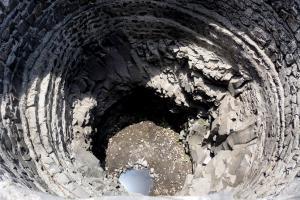
The hullabaloo of a wedding party is hard to miss on a Friday morning in Khopivali village of Murbad's Thane district. Located 90 km from Mumbai, the village sits below a mountain scape that boasts of a peaking hill. The village is drowning, albeit in the din of blaring speakers. A senior is singing a folk song that the local Agri community reserves only for celebrations like today: "Navri la zalia ghae, tila kondun thevli malyavar (The bride is in a hurry to get married, we have locked her on the mezzanine)," she shrills. A group of children strut around with faces smeared with haldi paste, make their way to the road and dance, not to the drone of her vocals, but Cho gada tara, Chabila tara, O re rangeela tara, blaring from a television in one of the homes that lines the street.
Vilas Dattatray Karale, 29, pulls out a wedding card from the an envelope. "She is lucky that she is a woman," he says of the bride, whom he addresses as his sister. "Only they find partners easily."
ADVERTISEMENT
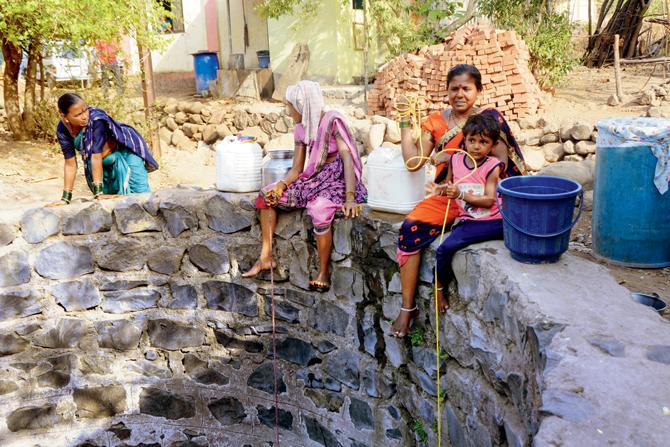
The women of Khopivali say although the water scarcity is an old problem, over the years, women have grown empowered and do not wish to spend the day foraging for water. All six wells and 46 borewells in the village are currently dry. Pics/Sneha Kharabe
He looks away when his uncle admits that the family has met 20 women from neighbouring villages in the last couple of years, in the hope that one of them would become Karale's bride.
In Khopivali, the residents, no matter how distant their blood ties, don't get married within the community. They call each other siblings. This means that the young men must find a match outside the village, and that has proven to be a challenge. Currently, says Karale, the village has between 50 and 60 bachelors. No one wants to marry into a home from a village that has seen severe water scarcity in the last six months.
Left high and dry
Just 500 metres from the shamiana, where the wedding is scheduled to take place over the weekend, is a 25-foot-deep kua or well where a few women have lined up to draw water. We are not sure what they are drawing into. If there is water, it is concealed by the craggy rocks. The women appear to have perfected the art of getting their plastic cans to manoeuvre through the boulders, and glug in a little of what is available.
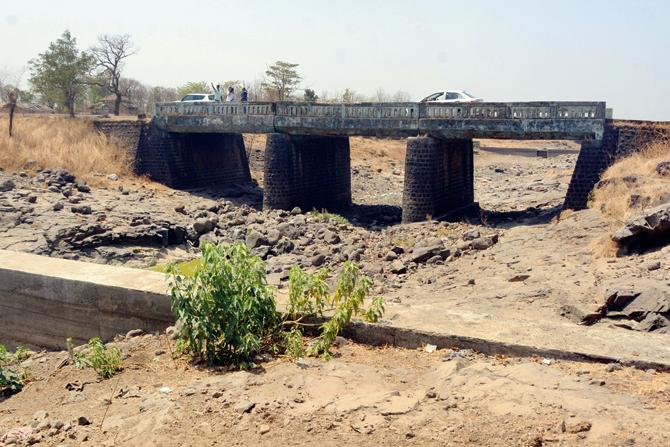
The Bhandkor river, which now lies dry, can get so boisterous in the rains that people can't even cross it for days. Sharda Harad's family stocks on vegetables found in the jungle, chaiwal, kolu, shewli and kodu, to stock up. "The river currents are strong and life threatening."
In Khopivali, there are six such wells to feed the village's 1,900 population. All wells are almost dry. The 46 borewells, constructed by the more enterprising residents, have been reduced to the same fate. "I don't remember a single year where we have had continuous water supply," says Sharda Pandurang Harad. She originally hails from Shindipada, 30 km from Khopivali, which if anything, is the promised land with abundant water. Harad got married and moved here when she was 15. That was 40 years ago. She has a lot to complain about, but she doesn't. "You make peace with what life throws at you," she says, leaning over the lip of the well.
These are, however, the last few weeks of the punishing summer. Come monsoon, the now, arid landscape will turn a vivid green, and the dry bed of a river, which cuts through Harad and Karale's plot, and is infamously named Bhandkor (wrangler in Marathi because of its temperamental nature) will overflow. The wells and borewells will be replenished, till the wet conditions last. This is the time, when the young men, who have taken up jobs in Badlapur, Thane and Kalyan, return to assist the family in the fields to grow bhaat (rice). "We have plenty of land here," says Karale. "Each family owns at least three acres. But we can only grow rice, because monsoon is the only time that the land is of any use."
The honeymoon season, however, ends by October, when the village experiences it's last spell of rain. By December, they are staring at a parched existence.
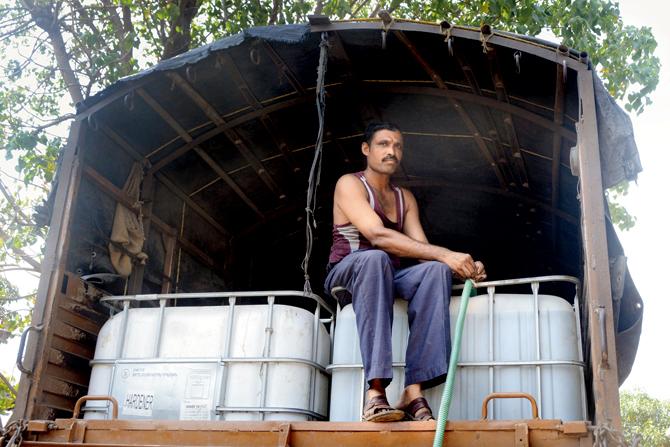
Shivaji Gunde transports water in tanks atop a truck from Mella village to Khopivali every four days, to be transferred into residential tanks
Not a drop to drink
Long before Khopivali had wells, villagers would travel kilometres into the forests to procure water from an artificial lake, which had reserves for the entire year. By the time Karale was born in 1990, the village had five wells. Around five years ago, members of the zila parishad, managed to get permission from the authorities to make another well. "The construction had just been completed. Now, they realise there is no ground water. The project is useless. They have decided not to dig deeper. We now have a well, but we don't have water." This well, which is close to Harad's home, is only used to store rain water.
Seven years ago, authorities built the Padale dam in Padale village, 1.45 km from Khopivali, to ease the water scarcity problems. The dam gets its water from Bhandkor, and is mainly used to irrigate agricultural land in the nearby villages, including the adivasi hamlet of Khutarwadi, which is home to 500 residents. While the river is now a skeleton of boulders, Padale is well stocked. "We have requested the authorities to provide a direct pipeline from Padale dam to Khopivali, but they have turned a deaf ear to our requests," says Karale. The problem, another villager on condition of anonymity, says, is that the gram panchayat comprises members from the Nationalist Congress Party, while the sitting MLA Kisan Kathore and the re-elected MP Kapil Patil from Bhiwandi, belong to the BJP. "When we ask the BJP workers for help, they say, go and seek help from the gram panchayat," the villager adds. Residents of Khopivali, who are caught in this political tussle, however, are not one to take things lying down. Only last month, Karale mentions how the women assaulted BJP party workers who had come to seek support to re-elect Patil to power. "Bahut maar-peet hui," he says. But, the villagers ended up voting for him. "Aakhir woh bhi Agri hai. Jaat wala hai, ek din jaatwalon ke kaam ayega," said another villager.
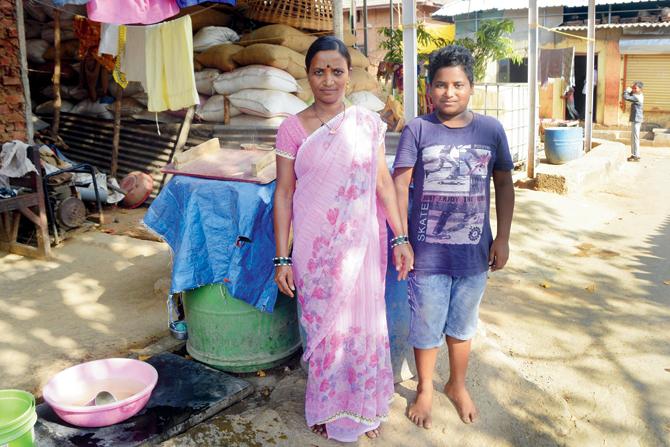
Dhanashree Bhande sends her 17-year-old daughter to her maternal village of Jhamburde with a pile of clothes for laundry every few days. When Bhande married into Khopivali in 2000, it was a life altering decision. In the initial years, she would carry drums of water at Rs 20 each on bullock carts from the nearby village of Mella
He speaks of the development in the BJP rule. Around Rs 3 lakh was spent to construct a shed for a Hanuman temple. What other development has occurred, we ask. "Nothing," he says, "Magar kya karein? Agri hai (But he, Patil, is Agri)." We inform him that the BJP claims it plans to build a metro line in Murbad. The villager interrupts, shocked, "Gh**ta! They can't give us water, and they'll build a metro?" He speaks of homes with toilets, but no water. "Sometimes we have to clean the mess with dry leaves. Is there a point in making toilets under the Swachh Bharat Abhiyan if we don't have water to use them?"
Karale says that the villagers had planned to put in R8 lakh out of their own pockets to build a pipeline to ensure Khopivali is connected to the Padele dam. "But the farmers whose land the pipeline was going to pass through, opposed the idea. Only if the government intervenes, can we hope to get it done."
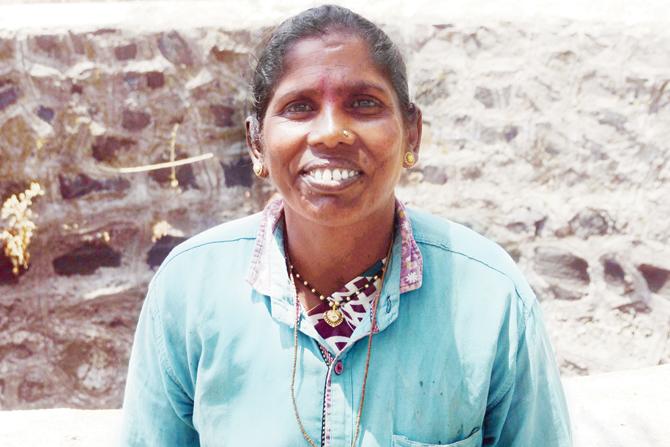
Sharda Harad
A controversial dam on the river Kalu also in Murbad taluka, which had come into news for being planned in a quake zone, has seen construction work start two years ago. It will provide water to Bhiwandi, Badlapur, Dombivali, Ulhasnagar, Ambernath and 376 villages in Thane. "That dam was anyway never meant for us," he shrugs.
MLA Kisan Kathore did not respond to this reporter's calls or messages. Patil who was re-elected last week, also remained unavailable for comment.
While admitting that previous plans to supply water to the village have failed, Radheshyam Aade, executive engineer, water supply department in the zila parishad, said, "We will be digging a new well near Dhasai Village [8 km from Khopivali] and transporting the water through tankers. The project hasn't begun, but we will ensure they don't suffer another dry season." The authorities explain that the soil in Khopivali is peculiar in its inability to hold water, which is why ground water reserves deplete right after the monsoon.
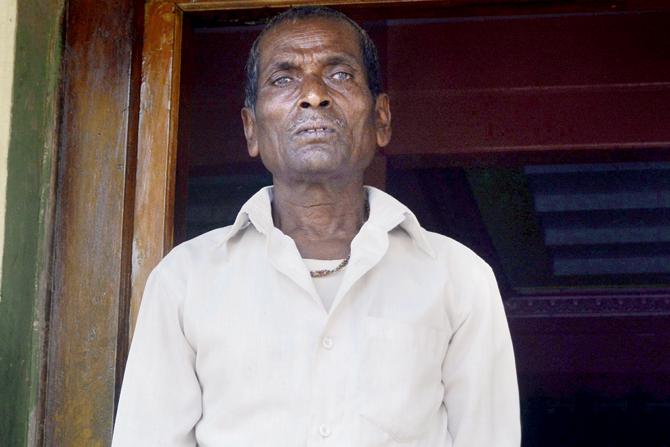
Baban Gunde, seeking a bride for son Janardhan
Maharashtra has been reeling under a severe water crisis for the last few years. While the state government had earlier declared 151 talukas (of a total of 358) as drought affected, it added 931 more villages spread across Dhule, Ahmednagar, Jalgaon, Parbhani, Jalna Osmanabad, Satara and Buldhana, to the list this January.
Agriculture and revenue minister Chandrakant Patil had said villages with lower than 75% rainfall and where farmers have declared less than 50% yield in crops have made it to the list of drought-affected.
Every drop is precious
Some years ago, the zila parishad made arrangements for a tanker from the MIDC area to fill water in one of the dry wells every day, from where residents would draw supply for their daily needs. "But the water is muddy, and can only be used in the toilet or to wash utensils," says Dhanashree Dhanaji Bhande, who originally hails from Jhamburde village, 9 km from Khopivali. Like Harad's village, Jhamburde had also not seen water shortage.
There are days when she sends her 17-year-old daughter Rushali to Jhamburde with a pile of clothes for laundry. When Bhande married into Khopivali in 2000, it was a life altering decision. In the initial years, she would carry barrels of water on bullock carts from the nearby village of Mella. "At the time, we would fill one large drum of water for Rs 20," she recalls. But owning bullocks meant a drum extra for them.
Today, almost every home boasts of a four-wheeler, mini truck or a sturdy car, which is used primarily to procure drinking water from Mella. Men from the village who own large trucks, have also started milking the crisis. They buy a drum for Rs 50, and sell it at Rs 100. Bhande needs at least two drums of water every day for her family of five, which includes two teenage sons and a daughter.
The same afternoon, we meet Shivaji Gunde, who just has just returned from Mella with 1,800 litres of water stored in Sintex water tanks piled on his truck. This water will be transferred into residential tanks using a motor. "I go to Mella every four days. I get water for myself and my extended family. We split the water between four homes," he says.
Where are the brides?
Karale shies away once too many times from talking about his bachelorhood. Although he runs a real estate business and dairy farm, he has found it hard to find himself a bride, because most women prefer men who are farmers. "If we had continuous water supply, we could farm all 12 months, growing a variety of crops. This would earn us between Rs 8 to Rs 10 lakh. Our businesses and jobs are unpredictable, and women don't like instability."
Like him, his 32-year-old neighbour, Janardhan Baban Gunde, is also single. The lack of job opportunities here sees him travel to Thane every day to manage a club, a commute that spans over four hours. His father, Baban, says that women don't want men with jobs that earn as little as Rs 10,000 and involve travel. None of the six alliances he has explored worked out. "We looked for girls all the way till Kalyan, but parents don't want their daughters to spend hours fetching water from wells,"
he says.
Bhande is anxious about the future of her sons, Rushikesh, 14, and Rushabh, 12. "My time is going to come soon. If the government doesn't help, likethe other parents, I too will have a headache to deal with." Rushikesh blushes, not quite fully aware what might await him.
Catch up on all the latest Mumbai news, crime news, current affairs, and also a complete guide on Mumbai from food to things to do and events across the city here. Also download the new mid-day Android and iOS apps to get latest updates
 Subscribe today by clicking the link and stay updated with the latest news!" Click here!
Subscribe today by clicking the link and stay updated with the latest news!" Click here!







